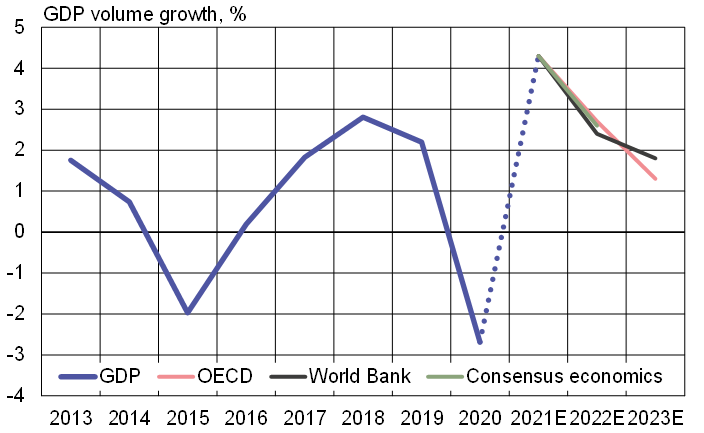BOFIT Weekly Review 1/2022
Russian economic growth expected to slow this year
The Russian economy recovered briskly last year from the Covid Recession, with GDP returning to pre-crisis levels already last summer. The preliminary estimates from the economy ministry suggest Russian GDP grew by 4.7 % y-o-y in the first eleven months of 2021. Growth accelerated a bit again in November, driven e.g. by the mineral extraction sector (includes oil & gas) and weather conditions that lead to an unusually extended harvest season. Signs of economic overheating began to appear towards the end of 2021 as e.g. inflation spiked and labour markets tightened. Rosstat’s initial estimate shows that consumer prices rose by 8.4 % y-o-y in December. The unemployment rate remained at a historically low level of 4.3 % in November.
Russia’s economic growth is expected to slow gradually. Recent forecasts expect Russian GDP to grow by 2–3 % this year and just 1–2 % in 2023. Economic growth faces numerous risks in the coming years. Even if covid infections have declined in Russia in recent weeks, the pandemic situation is still uncertain and could weaken economic growth both globally and in Russia. Persistent high inflation could erode the purchasing power of Russian households. In addition, heightened geopolitical tensions could increase uncertainty and hurt economic growth.
Russia’s growth prospects over the longer term are bleak. Potential GDP growth is generally estimated to be in the range of 1–2 % a year. Russia’s growth outlook is clouded by demographic challenges, a problematic business environment that constrains investments and productivity levels that are low by international standards. While these long-term issues have been well-recognised and Russia has launched numerous development programmes and strategic action plans to deal with them, the growth-enhancing impacts of the plans have been modest to date. The current narrowly-drawn economic policy framework focuses heavily on select state-led development projects. Observers note that the framework’s possibilities to significantly improve conditions for Russia’s long-term growth are limited. The challenges to Russia’s long-term growth and economic policy are discussed in more detail in a recently released BOFIT Policy Brief.
Major forecasts released in December see Russian GDP growth slowing this year

Sources: Consensus Economics, World Bank, OECD, Rosstat and BOFIT.